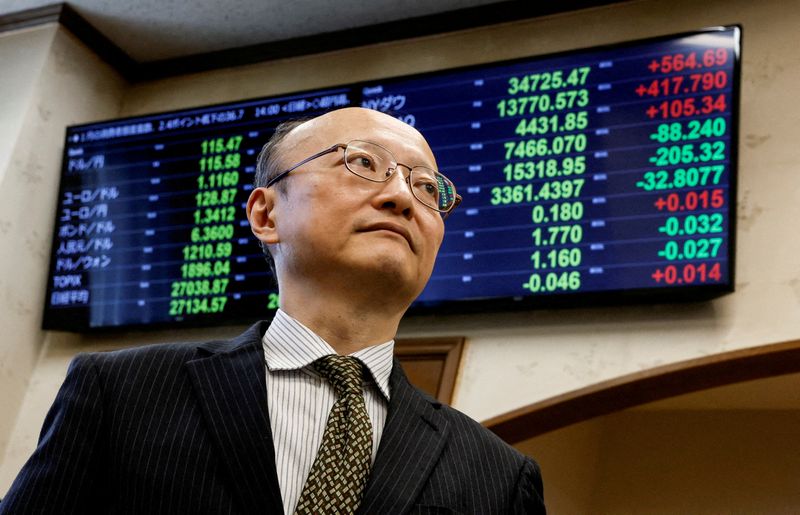By Leika Kihara
STRESA, Italy (Reuters) – Japan renewed efforts to stem excessive falls in the yen at a weekend meeting of Group of Seven (G7) financial leaders after a recent rise in bond yields to a 12-year high had failed to slow the currency’s persistent decline.
The government and central bank efforts underscore the dilemma policymakers face as they try to balance the need to stem sharp declines in the yen that harm consumption while keeping borrowing costs low to to shore up a fragile economy.
After lobbying by Japan, G7 finance ministers reaffirmed their commitment in a communiqué issued after their meeting in Italy on Saturday, warning against excessive exchange rate volatility.
The agreement came after Japan’s top currency diplomat Masato Kanda spoke Friday about the likelihood of renewed intervention in the currency market, telling reporters that Tokyo stood ready to act “at any time” to counter the yen’s excessive movement.
“If there are excessively volatile movements that have a negative impact on the economy, we should take action, and that would be justified,” he said.
Bank of Japan (BOJ) Governor Kazuo Ueda, who also attended the G7 meeting, indicated that soft consumption or rising bond yields will not hinder the normalization of monetary policy.
Ueda said Thursday that a slump in gross domestic product in the first quarter did not change the BOJ’s view that Japan’s economy was on track for a moderate recovery. Analysts have said the BOJ is likely to raise rates in the coming months if the economy moves in line with its forecasts.
He also did not speak out against the recent rise in yields to a 12-year high, which was partly driven by market expectations that the BOJ will soon phase out its bond purchases completely.
“Our premise is that long-term interest rates are determined by the markets,” Ueda said on Saturday when asked about recent increases in long-term interest rates in Japan.
The comments followed a series of hawkish signals from the BOJ that have increased market expectations of a near-term rate hike or a scaling back of its massive bond purchases.
Ueda has ruled out using monetary policy to influence the yen’s movement. But he escalated his rhetoric against the impact a weak yen could have on inflation after the currency’s fall led to a suspected yen-buying intervention by the government on April 29 and May 2.
A Reuters poll showed that many analysts expect the BOJ to raise rates in the third or fourth quarter of this year.
DATA CLOUDS OUTLOOK
Ueda also indicated that the BOJ is willing to slow but steadily raise rates if inflation sustainably reaches its 2% target in the coming years, as forecast.
But the data so far is not promising. Consumption is weak because wage increases have not yet kept pace with rising costs of living.
Service sector inflation, which is closely monitored by the BOJ as a key indicator of underlying price developments, also remains flat.
“Services inflation has probably peaked,” said Junichi Makino, chief economist at SMBC Nikko Securities. “It does not appear that underlying inflation will accelerate towards 2%.”
Given such weak signals in the economy, some analysts are shifting focus to whether the BOJ will taper its bond purchases as part of efforts to slow the yen’s decline.
Ueda has ruled out using the BOJ’s bond buying as a monetary policy tool after halting its radical monetary stimulus measures in March. But markets remain fixated on the BOJ’s market operations, looking for clues as to when it will start to taper.
Some analysts expect the BOJ to decide on scaling back bond purchases as early as its next policy meeting in June.
Market expectations of a near-term taper helped push 10-year Japanese government bond yields to a 12-year high of 1.005% on Friday.
But the rise in interest rates has not given the yen much of a boost. The rate stood at 156.98 against the US dollar on Friday, not far from the more than three-week low of 157.19 reached on Thursday.

“While markets seem excited about the possibility of a policy change, the BOJ is likely cool-headed about all this,” said Mari Iwashita, chief market economist at Daiwa Securities, ruling out the chance of a taper decision in June.
“Moreover, there is no guarantee that such a move can stop the yen’s fall.”


